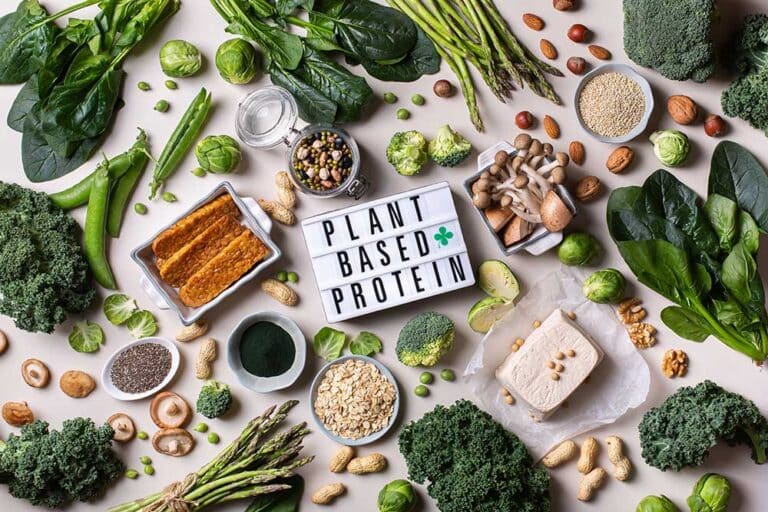Benefits of a Plant-Based Diet
Enhanced Longevity and Health
Research indicates that adopting a plant-based diet can contribute to increased longevity and overall enhanced health. This is particularly evident in centenarians, individuals who live to be 100 years old or older, who were studied in “Blue Zones” research (AFAA Blog). These individuals often consume diets rich in plants, which are linked to lower instances of chronic diseases such as heart disease, diabetes, and certain cancers.
Plant-based diets are also effective at lowering blood pressure, reducing cholesterol levels, and improving blood sugar regulation, all of which contribute to long-term health benefits and disease prevention (AFAA Blog). By focusing on whole, nutrient-dense foods such as fruits, vegetables, whole grains, nuts, and seeds, individuals can significantly improve their health and longevity.
| Health Outcome | Improved by Plant-Based Diet |
|---|---|
| Blood Pressure | Yes |
| Cholesterol Levels | Yes |
| Blood Sugar Regulation | Yes |
| Body Mass Index (BMI) | Yes |
Weight Loss and Body Mass Index Improvement
One of the key benefits of a plant-based diet is its potential to aid in weight loss and improve body mass index (BMI). Numerous studies have shown that plant-based diets are effective in promoting weight loss and in reducing BMI, making them an attractive option for those looking to shed pounds and improve their overall health (AFAA Blog).
Plant-based diets are often lower in calories than diets rich in animal products, as they focus on whole, unprocessed foods that are high in fiber and water content. This can increase satiety and reduce overall calorie intake, leading to weight loss. Additionally, plant-based foods are generally less calorically dense, which can help individuals maintain a healthy weight without feeling deprived.
The compound effects of shifting to a plant-based diet can lead to significant improvements in health outcomes over time, including better blood sugar regulation and enhanced gut health (WebMD). For those interested in transitioning to this lifestyle, check out our guide on how to start a plant-based diet.
To maximize the benefits of a plant-based diet for weight loss, it’s important to focus on nutrient-dense foods and avoid overly processed plant-based products. Incorporating a variety of high-protein plant-based foods, such as beans, legumes, tofu, and tempeh, can help maintain muscle mass and support a healthy metabolism. For more insights on this, visit our page on high protein plant-based foods.
Transitioning to a Plant-Based Lifestyle
Starting a plant-based diet involves understanding the fundamental principles and taking gradual steps to integrate more plant-based foods into your daily routine. The long-term health benefits of this dietary approach can be significant, making the transition worthwhile for those seeking to improve their well-being.
Basic Principles and Small Steps
To successfully transition to a plant-based diet and reap the weight loss benefits, it’s important to follow key principles and take small, manageable steps. Here are some foundational guidelines to get started:
1. Emphasize Whole Foods: Focus on consuming whole grains, fruits, vegetables, legumes, nuts, and seeds. These foods are rich in essential nutrients and fiber, which can help you feel full and satisfied while reducing overall calorie intake.
2. Reduce Processed Foods: Minimize the consumption of highly processed foods, which are often high in added sugars, unhealthy fats, and sodium. Instead, opt for whole, minimally processed options whenever possible.
3. Incorporate Plant-Based Proteins: Include a variety of plant-based protein sources in your meals, such as beans, lentils, tofu, tempeh, and quinoa. For more ideas, check out our list of high protein plant-based foods and plant-based diet protein sources.
4. Gradual Integration: Transitioning to a plant-based lifestyle can be more sustainable if done gradually. Start by incorporating plant-based meals a few times a week and gradually increase the frequency as you become more comfortable with the new eating pattern. Explore various plant-based diet recipes for inspiration.
5. Nutrient Diversity: Ensure you are getting a wide range of nutrients by including a variety of fruits, vegetables, and other plant-based foods in your diet. This approach helps in obtaining essential vitamins and minerals needed for optimal health.
Long-Term Health Outcomes
Adopting a plant-based diet can lead to significant health benefits over the long term. Research indicates that a plant-based dietary approach is a cost-effective, low-risk intervention for enhancing overall health (AFAA Blog).
Weight Management: Plant-based diets can lower calorie intake due to their high fiber content and lower energy density. Studies have shown that individuals on plant-based diets can experience 3-5 kg (~6-12 pounds) of weight loss (NASM). This weight loss contributes to improvements in body mass index (BMI) and overall body weight regulation.
Improved Blood Sugar Levels: Plant-based diets are linked to better blood sugar regulation and a reduced risk of type 2 diabetes. The diet’s high fiber content and lower calorie density contribute to improved insulin function and enhanced blood sugar control, which can prevent, manage, and even reverse type 2 diabetes (WebMD).
Heart Health: By lowering cholesterol levels and blood pressure, a plant-based diet can significantly improve heart health and reduce the risk of heart disease. The inclusion of nutrient-rich plant foods supports cardiovascular health and promotes better overall health.
| Health Outcome | Key Benefits |
|---|---|
| Weight Loss | 3-5 kg (6-12 pounds) reduction in weight (NASM) |
| Blood Sugar Regulation | Improved insulin function and blood sugar control (WebMD) |
| Heart Health | Lowered cholesterol and blood pressure levels (AFAA Blog) |
| Gut Health | Enhanced gut microbiome and digestive health (AFAA Blog) |
| Immune Support | Boosted immune function through essential nutrients (MD Anderson) |
The long-term benefits of a plant-based diet extend beyond weight loss. By following the outlined basic principles and taking gradual steps, individuals can achieve significant health improvements. For additional resources on transitioning to a plant-based diet, visit our guide on how to start a plant-based diet and explore our plant-based diet meal plan.
Impact of Plant-Based Diet on Chronic Diseases
A plant-based diet offers significant impacts on various chronic diseases. Here’s how it plays a role in managing heart disease and diabetes.
Medication Reduction and Heart Disease
Research indicates that plant-based diets may reduce the number of medications needed to treat chronic diseases, including heart disease (AFAA Blog). By focusing on nutrient-dense foods like fruits, vegetables, legumes, and whole grains, this diet can significantly improve cardiovascular health.
Key benefits include:
- Lower Blood Pressure: A diet high in fruits and vegetables is naturally low in sodium, which can help maintain healthy blood pressure levels.
- Reduced Cholesterol: Plant-based foods are generally free from cholesterol, which can help lower cholesterol levels.
- Improved Body Mass Index (BMI): Plant-based diets are effective for weight management, contributing to a healthier BMI.
Studies reveal a reduction in heart disease mortality rates, making plant-based diets a powerful tool for enhancing cardiovascular health.
| Health Metric | Impact |
|---|---|
| Blood Pressure | Lowered |
| Cholesterol Levels | Reduced |
| Heart Disease Mortality | Decreased |
| Body Mass Index (BMI) | Improved |
Lowering Diabetes Risk
Plant-based diets are not only beneficial for weight loss but are also highly effective in managing and preventing type two diabetes. According to WebMD, such diets typically result in lower body weight, improved insulin function, and enhanced ability to regulate blood sugar levels.
Advantages for diabetes management:
- Lower Body Weight: Consuming low-calorie, high-fiber foods helps in weight loss, reducing the risk of diabetes.
- Improved Insulin Sensitivity: Plant-based diets enhance the body’s ability to utilize insulin effectively.
- Balanced Blood Sugar Levels: The focus on whole grains and legumes contributes to a stable blood sugar profile.
A study from NASM observed that people following a plant-based diet have a significantly lower risk of being overweight or obese, correlating directly to diabetes risk reduction.
| Health Metric | Impact |
|---|---|
| Body Weight | Lowered |
| Insulin Sensitivity | Improved |
| Blood Sugar Regulation | Enhanced |
| Diabetes Risk | Reduced |
To dive deeper into meal planning and understanding food sources, check out our resources on plant-based diet meal plan and high protein plant-based foods. The benefits to overall health make a compelling case for adopting a plant-based lifestyle.
Key Nutrients in a Plant-Based Diet
A plant-based diet offers numerous health benefits, including weight loss and improved body mass index (plant-based diet and weight loss). It’s essential to ensure the intake of certain key nutrients to maintain optimal health.
Calcium, Choline, and Iron Sources
Calcium: Crucial for bone health, calcium can be sourced from plant-based options like fortified plant milks, tofu, almonds, and leafy green vegetables such as kale and bok choy.
Choline: Important for liver function, brain development, and muscle movement, choline can be obtained from cruciferous vegetables like broccoli, legumes, peanuts, and wheat germ (Verde Nutrition Co).
Iron: Essential for blood production, iron can be found in legumes, tofu, tempeh, nuts, seeds, and fortified cereals (Verde Nutrition Co). Including vitamin C-rich foods like citrus fruits and bell peppers can enhance iron absorption.
| Nutrient | Plant-Based Sources |
|---|---|
| Calcium | Fortified plant milks, Tofu, Almonds, Kale, Bok Choy |
| Choline | Broccoli, Legumes, Peanuts, Wheat Germ |
| Iron | Legumes, Tofu, Tempeh, Nuts, Seeds, Fortified Cereals |
For more information on incorporating these nutrients, see our guide on plant-based diet meal plans.
Plant-Based Protein and Essential Zinc
Plant-Based Protein: Protein is vital for muscle repair and enzyme function. Key sources include soybeans, lentils, chickpeas, beans, quinoa, nuts, seeds, and whole grains (Verde Nutrition Co). Incorporating a variety of these can help meet your protein needs effectively.
Zinc: This nutrient is crucial for immune function and DNA synthesis. Zinc can be sourced from legumes, nuts, seeds, wheat germ, tofu, sundried tomatoes, fortified foods, and cocoa powder.
| Nutrient | Plant-Based Sources |
|---|---|
| Protein | Soybeans, Lentils, Chickpeas, Beans, Quinoa, Nuts, Seeds, Whole Grains |
| Zinc | Legumes, Nuts, Seeds, Wheat Germ, Tofu, Sundried Tomatoes, Fortified Foods, Cocoa Powder |
For more details on high-protein options, visit our article on high protein plant-based foods.
Ensuring an adequate intake of these nutrients is fundamental for anyone adopting a plant-based lifestyle. It’s important to plan meals carefully to meet nutritional needs. For beginners, our resources on how to start a plant-based diet can be very helpful.
For those focusing on weight loss benefits, see our section on plant-based diet and weight loss for more insights.
Differentiating Veganism and Plant-Based Diets
Ethical Principles and Diet Composition
Veganism and a plant-based diet may appear similar, but their underlying principles and dietary compositions highlight distinct differences. Veganism, a term coined in 1944 by Donald Watson, extends beyond just dietary choices. It encompasses a lifestyle that avoids using and exploiting animals in all aspects of life. This includes abstaining from consuming animal-derived foods such as eggs, meat, fish, poultry, cheese, and other dairy products.
Approximately 2% of Americans identify as vegans, with a significant portion belonging to the Millennial generation. Veganism’s emphasis on ethics and animal welfare means that vegans also avoid using products tested on animals or containing animal ingredients, such as certain cosmetics and clothing items.
On the other hand, a plant-based diet primarily focuses on consuming foods derived from plants. This includes vegetables, fruits, nuts, seeds, oils, whole grains, legumes, and beans. Individuals following a plant-based diet for optimal health benefits typically aim to reduce or eliminate animal products from their diet due to health reasons rather than ethical ones. While the plant-based diet emphasizes whole, minimally processed foods, it does not strictly forbid the occasional consumption of animal products.
It is possible to be both plant-based and vegan, as these terms are not mutually exclusive. Many individuals may start by adopting a vegan lifestyle for ethical or environmental reasons and then transition to a whole foods, plant-based diet for health-related goals (Healthline).
Nutrition Planning and Supplement Considerations
Both vegans and those on a plant-based diet need to ensure they receive adequate nutrition by paying attention to essential nutrients that might be lacking. This includes monitoring their intake of calcium, vitamin D, protein, and vitamin B12, especially since the exclusion of animal products can lead to deficiencies in these areas.
| Nutrient | Vegan Sources | Plant-Based Sources |
|---|---|---|
| Calcium | Fortified plant milks, tofu, leafy greens | Same as vegan |
| Vitamin D | Fortified plant milks, sun exposure | Same as vegan |
| Protein | Legumes, nuts, seeds, tofu, seitan | Same as vegan, including occasional animal products |
| Vitamin B12 | Fortified foods, supplements | Same as vegan, possibly through occasional animal products |
For those following a vegan diet, it is crucial to supplement with vitamin B12, as it is naturally found only in animal products. Similarly, fortified foods and supplements might be necessary to meet calcium and vitamin D requirements.
Individuals on a plant-based diet may also benefit from focusing on diverse food sources to ensure balanced nutrition. Resources like high protein plant-based foods and plant-based diet protein sources can help in planning well-rounded meals.
By understanding these distinctions and adopting appropriate nutrition strategies, both vegans and those on a plant-based diet can enjoy the health benefits of their dietary choices. For more information on how to begin, visit our guide on how to start a plant-based diet.
For more details on transitioning to a plant-based lifestyle while ensuring balanced nutrition and meeting long-term health goals, browse our comprehensive plant-based diet meal plan.
Plant-Based Diets for Cancer Prevention
Inflammation Reduction and Cell Protection
Consuming a whole food, plant-based diet is known for its numerous health benefits, including its ability to reduce inflammation and protect cells. Foods rich in fiber, such as fruits, vegetables, and whole grains, play a crucial role in cancer prevention. Fiber enhances gut health, aids in nutrient absorption, supports the immune system, and reduces inflammation (MD Anderson). Unprocessed plant foods are also effective in lowering cholesterol, stabilizing blood sugar, and promoting good bowel management.
| Plant-Based Food | Benefits |
|---|---|
| Fruits & Vegetables | High in fiber, vitamins, antioxidants |
| Whole Grains | Aid in nutrient absorption, reduce inflammation |
| Legumes | Support gut health and immune system |
| Nuts & Seeds | Provide healthy fats and essential nutrients |
The antioxidants present in plant-based foods help to protect cells from damage caused by free radicals. Free radicals can trigger inflammatory processes and lead to the development of chronic diseases, including cancer. By incorporating a variety of antioxidant-rich foods into their diet, individuals can enhance cell protection and reduce their cancer risk.
Disease Risk Reduction and Immune System Support
A plant-based diet not only helps in reducing inflammation but also lowers the risk of several types of cancer, such as colorectal, breast, prostate, ovarian, and esophageal cancers. Abstaining from animal products and high-fat foods decreases the likelihood of developing these cancers (WebMD). Additionally, such diets are rich in antioxidants, folate, and vitamin E, which are crucial for boosting brain health and preventing cognitive conditions such as Alzheimer’s disease (WebMD).
Moreover, maintaining a healthy weight through a plant-based diet is key in cancer prevention. Excess weight can lead to inflammation and hormonal imbalances, increasing the risk for various cancers. Plant-based diets, being lower in calories and high in nutrients, help individuals to manage their weight effectively.
| Cancer Type | Risk Reduction |
|---|---|
| Colorectal Cancer | High fiber intake improves gut health |
| Breast Cancer | Weight management balances hormones |
| Prostate Cancer | Low-fat plant-based foods decrease risk |
| Ovarian Cancer | Plant foods prevent cell damage |
For those looking to optimize their health and lower their cancer risk, adopting a plant-based diet can be highly beneficial. Making small changes such as including more fruits, vegetables, legumes, and whole grains in daily meals can make a significant difference. Explore our plant-based diet recipes for delicious and nutritious meal ideas. Learn more about the benefits of plant-based eating and consider following a plant-based diet meal plan to get started.
- About the Author
- Latest Posts
Johnnie D. Jackow Sr., the founder and CEO of Total Body Fitness, Worldwide, has a long-standing career in the fitness industry. He began as a certified personal trainer in the mid-90s and soon after authored his first weight loss book in 1998. This led to the launch of Total Body Fitness, Nationwide in the USA at the same time. Johnnie gained recognition as the fitness guru of his time, running infomercials on local TV late at night in Houston, Texas. Over the years, he has helped more than 40,000 individuals from all over the world achieve their health and fitness goals. With over 60,000 hours of documented training in integrative functional medicine, he completed his PhD in human physiology in 2010. His primary objective is to assist people in reaching their health and fitness goals through alternative approaches rather than relying solely on conventional medicine and pharmaceutical drugs. Today, with almost three decades of experience under his belt, Johnnie continues to be a leader in health and fitness.








